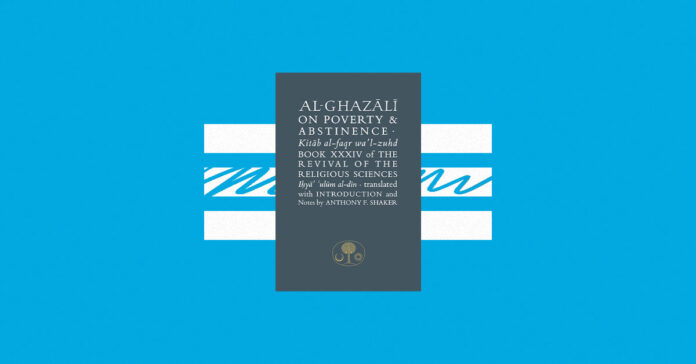The Book of Poverty and Abstinence is the thirty-fourth chapter of The Revival of the Religions Sciences. It falls in the section dealing with the virtues. Ghazali gives definitions of what real poverty and abstinence should be and how the poor should conduct themselves. He goes on to describe poverty that has no virtue and which is based on greed and love of the world. For Ghazali, the virtues of real poverty and abstinence are closely linked with patience, contentment, lack of worldliness, asceticism, trust and surrender to God.
Excerpts:
- Man sees the world’s exterior in the form of a beautiful woman ambling and swaggering along. Her interior reveals itself as aged disfigurements kneaded from the thickened mud of shame and moulded into condign punishment. Wrapped in her robe, she conceals her ignominious secrets through wily charm and artifice. She lays her snares in the paths of men, angling them through cunning and ruin. But then, never content with their moments of encounter, she bridles them with shackles and chains upon the reunion, and burdens them with all manner of trial and fetters. Once those cognisant [of the inner meaning of things] (ārifūn) discover her ignominious secrets and deeds, they renounce her with aversion. Abandoning her, they abandon vainglory and the amassing of wealth. With deepest resolve, they turn to the Presence of Majesty, trusting in a reunion that knows no separation, in a vision of eternity that has no evanescence or extinction. [p. 1-2]
- Now, the world is an enemy of God Exalted. By its illusions shall the errant be misled. By its cunning shall those who err commit their error. Yea, love of the world is the fountainhead of fault and sin; and aversion to it is the mother of pious deeds and the foundation of acts pleasing to God. [p. 2]
- Beyond these five states is a state higher than abstinence namely, where the presence and absence of money are of equal value. The presence of money will neither gladden nor distress [God’s servant], and likewise, his lack of money. Indeed, his state is similar to that of Ā’isha (may God be pleased with her) upon receiving a gift of one hundred thousand dirhams. She took the sum and distributed it the very same day. Her servant-girl asked her, ‘With all that you have distributed today, were you able to purchase for us one dirham’s worth of meat that we may break our fast?’ She replied, ‘I would have done it had you reminded me.’…. A person in this state cannot be harmed by the world were he to hold it, with all its treasures, in the palm of his hand. He regards all wealth as lying in the treasury of God, not in his own hand. It matters little to him that he or someone else should possess it. In such a situation, a person is aptly called ‘indifferent’ (mustaghni), being impartial to the money either gained or lost. [p. 9]
- The only veil between you and God is your pre-occupation with what is other than Him. Your absorption with yourself and with your appetites is a preoccupation with what is other than God; and being ceaselessly absorbed with yourself and your appetites, you will remain veiled from Him. Therefore, l just as one who is absorbed in self-love is distracted from Him, so he who is absorbed in self-loathing is equally distracted from Him. [p. 11]
- It is said that a poor man came to a gathering of [Sufyān] al-Thawri’s and was told, ‘Come over! Had you been rich, I would not have brought you near.’ His wealthy companions used to claim they were poor from his great closeness to the poor and his avoidance of the rich….
- Said al-Mu’ammal [b. Ismail al-Adawi al-Basri], ‘I have not seen anyone lowlier than the rich at the gathering of Thawri. Nor have I seen anyone more honoured at the gathering of Thawri than the poor.’
- As one sage held, ‘Miserable is man. If he feared the Fire as much as he does poverty, he would be saved from both. If he desired Paradise as much as he does wealth, he would achieve both. If he feared God interiorly as he does God’s creatures exteriorly, he would find felicity in both worlds.’
- [Abd Allāh] Ibn Abbas, ‘Cursed is the one who honours wealth and slights poverty. [p. 27]
- A sage was once asked, ‘What is wealth?’ His answer, ‘Your few aspirations and your contentment with what suffices you.’
- It is said that Ibrahim b. Adham was one of the well-to-do of Khurasan. One day, while looking from atop a palace of his, he saw a man in the courtyard eating a loaf of bread in hand. Having eaten, the man fell asleep. ‘Bring him to me when he wakes,’ Ibrahim instructed one of his servants. Upon waking the man was brought to him and Ibrahim asked, ‘Did you eat the loaf of bread from hunger, man? ‘Yes,’ replied the man. ‘Are you sated?’ Ibrahim asked. ‘Yes.’ ‘And you slept soundly?’ ‘Yes. Ibrahim then said to himself, ‘What have I to do with this world when the soul is content with so little?’ [p. 31]
- Muhammad b. Wasi al-Basri used to take out desiccated bread, moisten it with water and eat it with salt, saying, ‘Whoever is content with this from the world needs no one.’
- Likewise, said al-Hasan [al-Basri], ‘God has cursed nations to whom God Exalted had made a promise but they believed Him not. He then recited, ‘And in heaven is your sustenance and what you are promised. And by the Lord of heaven and earth, this is the very truth.’ [Qur’an 51:22]
- Abu al-Darda (may God be pleased with him) was one day sitting among people. His wife came to him, saying, ‘You sit among these people but, by God, there is not a fleck or speck of anything in the house.’ Said Abu al-Darda, ‘O woman, before us lies a steep road from which there is no deliverance save for every lightly burdened person.’ She returned content.
- Dhu’l-Nun [al-Misri], ‘Of all people, the closest to unbelief is one who has a need but no patience.’
- And a sage was asked, ‘What is your wealth?’ His answer, ‘Self-adornment on the outside, [good] intention on the inside and renunciation of what is in the hands of people.’ [p. 32]
- The world is the darling of the heedless. The one deprived of it is absorbed in its quest; while the one who possesses it is absorbed in preserving and enjoying it.
- This is why the Companions said, ‘When the trial of adversity befell us, we endured. But when the trial of well-being befell us, we could not.’ [p. 38]
- For the Prophet (ﷺ) said, ‘Wealth is not abundance of goods. Wealth is the self-sufficiency of the soul.’
- When this [possibility] is remote, the loss of wealth is then more appropriate for everyone, whether by giving it away in charity or spending it on good works. This is because, commanding wealth, they cannot separate themselves from intimacy with this world, from the enjoyment of power in it and from the sense of leisurely spending in it all of which bequeath intimacy with this world. And the more intimately familiar a person becomes with the world, the more he will be estranged from the Hereafter. The more familiar he is with one or another attribute of his besides his cognisance of God, the more estranged he will be from God and the love of God. Whenever the causes for intimate familiarity with the world are extirpated, the heart eschews the world and its sheen. When the heart eschews what is other than God and has faith in God, it will perforce turn to Him in devotion, since no heart can be void. [p. 39]
- This is also why Shaqiq [al-Balkhi] said, ‘The poor have chosen three things and the wealthy three. The poor have chosen tranquillity of the soul, freedom of the heart and lightness of the account. The rich have chosen weariness of the soul, anxiety of the heart and severity of the account.’ [p. 42]
- Said ‘Umar [b. al-Khattab] (may God be pleased with him), ‘Abstinence from the world is repose for the heart and the body.’
- Said Bilal b. Sa’d [b. Tamim al-Ash’ari], ‘How great an offence it is! God Exalted induces us to abstain from this world while we desire it!’ [p. 99]
- Said Ibrahim b. Adham, ‘Our hearts are covered by three veils, and certitude is not uncovered for the servant [of God] until these veils are lifted: joy in what is nigh, grief for what is lost and delight in praise. If you rejoice in what is near, you are covetous; grieve for what is lost and you are discontented, and the discontented will be punished; delight in praise and you are vain, and vanity debases the deed.’ [p. 100]
- Sufyan al-Thawri used to say, ‘This world is the abode of crookedness, not the abode of uprightness; the abode of grief not of cheer. He who knows it shall neither delight in comfort nor grieve in distress.’ [p. 101]
- Abu Sulaymān al-Darani had said, for he declared, ‘We have heard much said about abstinence. For us, abstinence is the relinquishment of everything that distracts you from God (Almighty and Majestic).’
- Abu Sulayman recited the words of God, …but only he that offers up a sound heart to God. He said that this was the heart that contained nothing but God.
- He said, ‘They abstain from the world because their hearts are, for the [sake of] Hereafter, free of their cares.’ [p. 113]
- Abu Sulayman al-Darani’s is the soundest pronouncement, ‘All that distracts from God—wife, money or child—is ill-boding.









